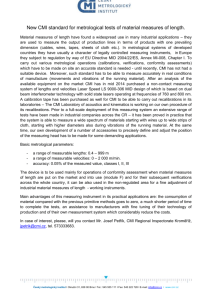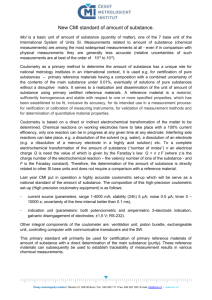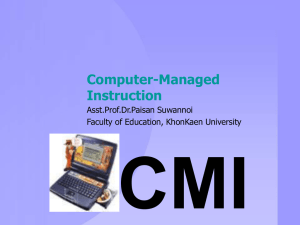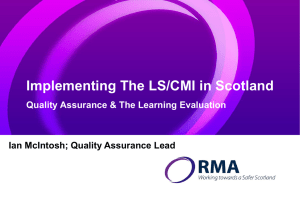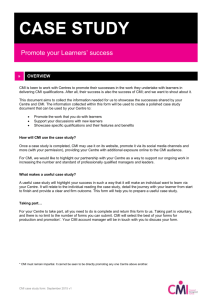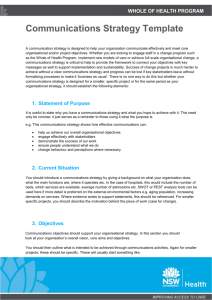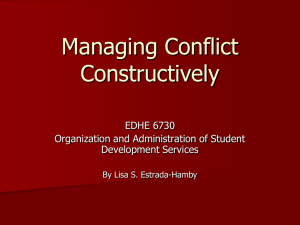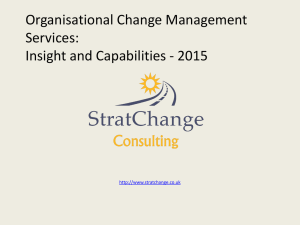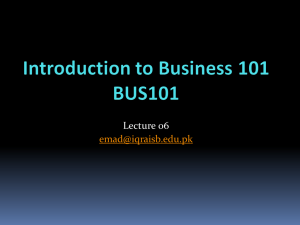(JODP) External Assignments - Chartered Management Institute
advertisement
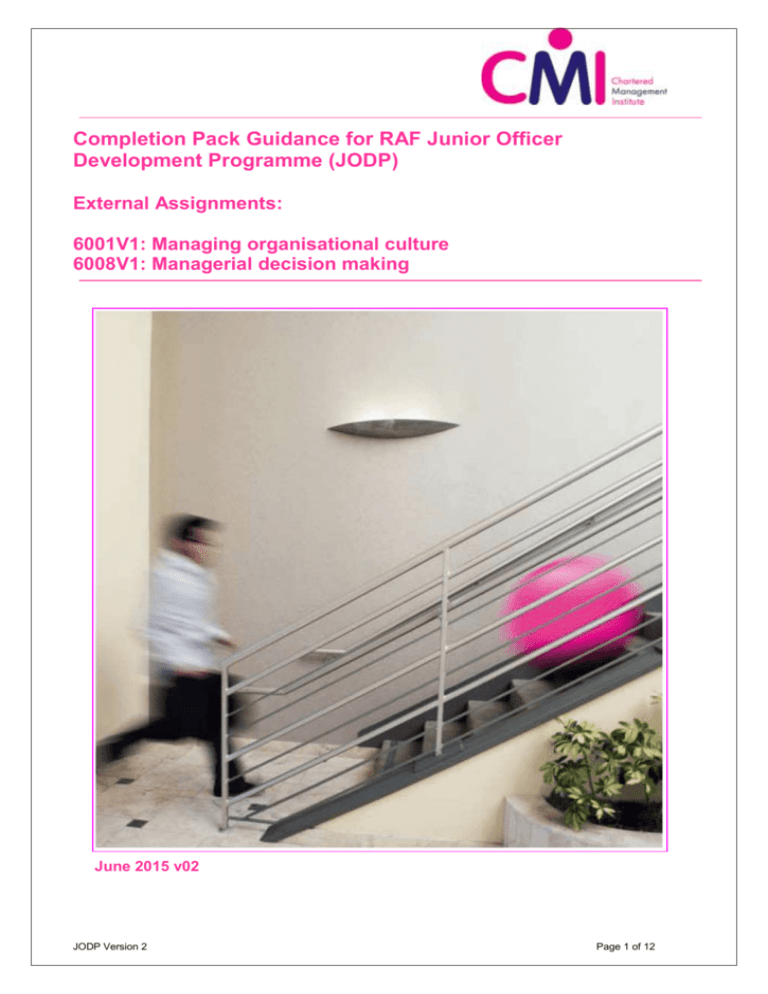
Completion Pack Guidance for RAF Junior Officer Development Programme (JODP) External Assignments: 6001V1: Managing organisational culture 6008V1: Managerial decision making June 2015 v02 JODP Version 2 Page 1 of 12 CONTENTS Title Page Number Overview of the Completion Process 3 Introduction 4 Support for gaining CMI qualifications 4 Additional Units: Completion Requirements 5 Assessment Criteria 5 Registering for the Awards 5 Submitting your work for External Assessment 6 Pass 6 Referral 6 Guidance for Learners 6 Plagiarism and Collusion 7 Word Count 8 Referencing 8 Further Instructions 8 Assignment for Unit 6001V1 – Managing organisational culture 10-12 Assignment for Unit 6008V1 – Managerial decision making 13,14 Registration Form 15,16 Statement of Authenticity JODP Version 2 17 Page 2 of 12 Overview of the Completion Process Registering for the CMI level 6 qualification requires documentary evidence that you have successfully completed all JODP Modules Carefully read through the Completion Pack Guidance Complete the Registration Form and forward with remittance (if not already done) Complete Assignments Use course materials, notes, publications, any relevant elearning material, and CMI web support or ask people you may consider able to help Forward electronic copies of assignment and electronically signed copy of Statement of Authenticity to ea.marking@managers.org.uk. Alternatively send both in the post. Keep a copy for safeguard against loss. PASS REFER Assignment is returned to you for amendment Awarded CMI Level 6 Certificate in Management and Leadership (QCF) (6C1V1) with 14 credits Membership subsequently offered (level may be different to MOD Guaranteed Membership Scheme) JODP Version 2 Page 3 of 12 Introduction The Chartered Management Institute (CMI) has undertaken detailed mapping of many MOD service career development courses with a view to recognising them against nationally recognised qualifications. Successful completion of two assignments will enable you to be eligible for the following CMI qualification: CMI Level 6 Certificate in Management and Leadership (QCF) comprising units 6001V1 and 6008V1 that total 14 credits. Completion of this work should make Standard Learning Credits available to offset your personal cost For the CMI Level 6 Certificate Management and Leadership (QCF) you must complete and submit assignments for Units 6001V1 and 6008V1, comprising a number of tasks and contained in this completion pack. This qualification is immediately transferable to, and acknowledged by, the civilian business world as a benchmark qualification expected for a middle management position. It is commended to all students as an extremely valuable addition to your in-service qualifications. Note that you have 9 months to submit your external assignments for marking. It is very important that you contact CMI by telephone: +44 (0) 1536 207496 before this time if you are encountering difficulties. After this time the CMI Level 6 Certificate in Management and Leadership (QCF) registration will lapse; CMI will not refund the registration fee. Support for Gaining CMI Qualifications This CMI qualification Completion Pack provides you with the support information you need for the External Assignments. For the duration of your qualification programme you are given complementary ‘Affiliate Membership’ of CMI. This enables you to access a wide range of support material on the CMI Studying Members website. NOTE: If you have not already logged on to the CMI Website you now need to do so using the username and password contained in your CMI Welcome Letter. Once logged in, to access support for Unit 6001V1 and Unit 6008V1 use the following steps: Unit 6001V1 Opening Screen – Place mouse arrow over the ‘ “More” option and select “CMI Qualifications” from the options Next Screen – Shows a list of qualifications. Select 6C1V1 – CMI Level 6 Certificate in Management and Leadership (QCF) and ‘click’. Next Screen – Select Unit ‘6001V1’ and ‘click’. This will open Unit 6001V1 Learning Outcomes (LOs). Between the LOs there are red font links to ‘Find Resources’. By ‘clicking’ these open you will find comprehensive support for the appropriate LO. Resources include documents, podcasts, video clips and recommended reading. Note that there may find some duplication of resource references as the LOs are interrelated. Unit 6008V1 Follow the process as for Unit 6001V1 above but at the fourth bullet point ‘List of qualifications’, select 6008V1 and ‘click’. Identification of support is as per the paragraph above. Unsure about anything? Please contact CMI on: +44 (0) 1536 207496 during office hours (0900-1700 hours Monday to Friday), or JODP Version 2 Page 4 of 12 at mod@managers.org.uk Additional Unit: Completion Requirements You are required to complete two additional unit assignments to obtain the CMI Level 6 Certificate in Management and Leadership (QCF) at 14 credits. Guidance on completing the assignments and submitting your work to CMI are on pages 6 and 7, respectively. You are also encouraged to submit a reflective statement of no more than 300 words (in addition to the assignment word count) describing the value and knowledge gained from undertaking the assignment. This statement will not be assessed; however it encourages you to review the value and application of your learning. The table below summarises how your JODP course matches the two awards. CMI Level 6 Certificate in Management & Leadership (QCF) Unit 6001V1: Managing organisational culture Unit 6008V1: Managerial decision making Credits Met/ Not Met by JODP Actions 7 Not Met 7 Not Met CMI External Assessment to be completed Registering for the Qualification If you have not already done so, you need to register for this qualification. All registration forms must be accompanied by evidence that you have successfully completed your JODP course (copy of the relevant section of your end of course certificate signed off by an officer of SO2 rank), and the requisite remittance (cheque or credit card details). Send this to the CMI at the address shown on the form. Submitting Your Work Once you have completed your assignments, you must forward them, along with a signed copy of the Statement of Authenticity (as a single file with your completed Statement of Authenticity as the first page) by e-mail to ea.marking@managers.org.uk . The e-mail must not exceed a file size of 5MB. You are strongly advised to keep a copy of your assignments to safeguard against loss; your assignments will not be returned to you but will be destroyed by safe and confidential means. For guidance on presenting your assignment see pages 6 to 9. Please note that CMI does offer a paper based assessment service for learners who are unable to provide an electronic copy. Post the assignment along with your signed Statement of Authenticity to: External Assignments/MOD; Awarding Body; Management House; Cottingham Road; Corby; Northamptonshire NN17 1TT. PASS: If a pass is achieved, CMI will issue you with your qualification certification and your units / credit certificate along with an offer of graded membership of the Chartered Management Institute. This level of membership may be lower than that offered by the MOD guaranteed membership scheme – you can opt for either. REFERRAL: If your assignment does not meet the pass standard, it will be returned to you with guidance notes for completion. You must meet the additional requirements before re-submitting the assignment. You will be allowed two further re-submissions (i.e. 3 in total). Guidance for Learners The Chartered Management Institute provides a comprehensive external quality assessment service. Currently assignment briefs are available for all units from levels 2 to 7 of the Management and Leadership qualifications, and for levels 3, 5, and 7 of the Coaching and Mentoring qualifications. CMI provide a six week service level on all assignments received. Learners are required to complete all tasks. JODP Version 2 Page 5 of 12 Assignment Guidelines All work must be submitted in a single electronic document (.doc file). The document must be marked with the learners name, number and unit number. Electronic assignments should be sent to ea.marking@managers.org.uk. models. Any models described and other quotes used must be properly attributed and referenced as appropriate. Learners must acknowledge or reference any sources that have been used to complete the assignment, listing reference material and web sites used, appendices must not be included. Please note CMI do offer a paper based assignment service for learners that are unable to provide an electronic copy only. Please post the assignment to: External Assignments/MOD, Awarding Body, Management House, Cottingham Road, Corby, Northamptonshire, NN17 1TT. The assignment should be your own work and not direct copies of theories or Learners are encouraged to produce a reflective statement of no more than 300 words (which does not count towards the final word count), describing the value and knowledge gained from undertaking this assignment. The reflective statement is not assessed; however it encourages you to review the value and application of your learning. Word count: 2500 - 3000 words Plagiarism and Collusion In submitting the assignment the learner must complete a statement of authenticity (included in the Completion Pack) confirming that the work submitted for all tasks is their own and does not contravene CMI policies including word count and plagiarism. Academic offences, including plagiarism and collusion, are treated very seriously. Plagiarism involves presenting work, excerpts, ideas or passages of another author without appropriate referencing and attribution. Collusion occurs when two or more learners submit work which is so alike in ideas, content, wording and/or structure that the similarity goes beyond what might have been mere coincidence. Plagiarism and collusion are very serious offences and any learner found to be copying another learner’s work or quoting work from another source without recognising and disclosing that source will be penalised. In submitting their assignment for the unit, and completing the relevant statement of authenticity, learners are confirming that the work submitted for all tasks is their own and does not contravene the CMI policies including word count, plagiarism and collusion . CMI reserves the right to return assignments if the necessary statements of authenticity have not been completed. Learners found to be in breach of these regulations will be reported to the relevant CMI contact for deliberation. The learner will be notified in writing of the outcome of the investigation. In the event that a learner is found to have perpetrated malpractice, the learner will be withdrawn from his/her qualification immediately; fees will not be refunded, the relevant Regulatory Body will be informed and membership of the CMI will be withdrawn. Appendices Appendices should not be included. All use of tables, graphs, diagrams, Gantt chart and flowcharts should be incorporated into the main text of the assignment. Any published secondary information such as annual reports and company literature, should be referenced in the main text of the assignment but not included. Confidentiality Where learners are using organisational information that deals with sensitive material or issues, they must seek the advice and permission from that organisation about its inclusion in JODP Version 2 Page 6 of 12 an assignment. Where confidentiality is an issue, studying members are advised to anonymise their assignment so that it cannot be attributed to that particular organisation. Word Count Policy In total, it is required that your assignment should be between 2,500 - 3,000 words. Learners must comply with the required word count, within a margin of +10%. These rules exclude the index (if used), headings, information contained within references and bibliographies. When an assessment task requires learners to produce presentation slides with supporting notes, the word count applies to the supporting notes only. Where a learner’s work has contravened the word count policy, it will be reviewed by the Assessor and Chief Assessor before a final decision is made. Referencing and Professionalism A professional approach to work is expected from all learners. Learners must therefore identify and acknowledge ALL sources/methodologies/applications used. The learner must use an appropriate referencing system to achieve this. Whilst marks are not awarded for the use of English, the learner must express ideas clearly, succinctly, and ensure that appropriate terminology us used to convey accuracy in meaning. Submission of Assignments Assignments are to be emailed by the student to ea.marking@managers.org.uk. Learners are to complete the ‘External Assessment Statement of Authenticity’, if this is not attached the email will be returned. Each learner’s file to be entitled – learner name, learner number, the unit number – one file per learner. Please note that CMI is unable to receive attachments over 5MB. Instructions and Information for Learners The external assignment is set and assessed by the Chartered Management Institute. It is designed to assess your achievement of all the Learning Outcomes and associated assessment criteria in the relevant unit of the qualification you are undertaking. You should make sure that you plan your work carefully, to ensure that you cover all the requirements of the assignment, and complete it within the time limit specified. Your statements, in answer to the tasks, need to be prefixed with the specific task number and unit title. This will help you keep on track and should ensure you address the details. Work submitted without a task prefix will be returned unmarked. Your statements should not be just a description of work place activities but should include what you have learned from your programme of study. In other words you need to show how you can relate what you have learned to day-to-day management activities. You must submit your work as a single electronic word document (.doc file). You should mark the assignment with your name, learner number, the unit number, the Centre name – RAF JODP - and a brief description of the context in which the assignment was undertaken. You may include a title page if you wish. You must show a total word count on the front page of your assignment. You are strongly advised to keep a copy of your completed assignment before you submit it for assessment – the copy you submit will not be returned to you. Your assignment may be kept by the CMI for quality assurance purposes. Any assignment not kept for quality assurance will be securely destroyed. CMI will assess your assignment, and the result will be sent to you, normally within 6 weeks of receipt by the CMI. JODP Version 2 Page 7 of 12 If your assignment is assessed as referred, notification will be sent to you with an indication of the areas to be addressed. You may resubmit an assignment on a further two occasions during your period of registration as a CMI learner. If there is anything in these instructions or in the assignment itself which you do not understand, please seek guidance from CMI by phone on 01536 207496. Unit 6001V1 – Managing organisational culture Introduction This unit is about organisational culture, its impact on strategy, performance and the development of appropriate cultures; it also addresses national cultural differences. Scenario Learners may use their own employment context, or that of another organisation with which they are very familiar, to base their assignment. However, in the case that they are not able to do so, please use the below scenario: You are a senior manager of a medium sized company. Your organisation has a positive culture with staff being motivated and well supported. However, there are situations where some staff exhibit inappropriate behaviours which are not aligned with the organisational values. Your role is to help develop and communicate the culture and demonstrate an awareness of influencing factors to be considered. Task 1: Analyse the concept of organisational culture, where possible contextualise the analysis by using two different organisations. Consider key factors such as rituals, routines and behaviours and how these can affect achievement of organisational objectives. Describe the traits of power culture, role culture, task culture and person culture; compare the different traits of these cultures. Evaluate three internal and three external factors that could influence organisational culture including national cultures. Consider how these factors may influence the culture in a positive or negative way. Guideline word count: 850 – 1000 words A.C. 1.1 - Analyse the concept of culture to organisations A.C. 1.2 - Compare the traits of power culture, role culture, task culture and person culture A.C. 1.3 - Evaluate internal and external factors that could influence organisational culture, including national cultures JODP Version 2 Page 8 of 12 Task 2: Identify values and cultures that encourage behaviours to support the organisational strategy. Consider leadership styles a manager can adopt and evaluate personal managerial behaviours that can reinforce organisational values and cultures. Establish how to communicate organisational values to the organisation that motivate the organisation to apply these values. Guideline word count: 850 - 1,000 words A.C. 2.1 - Identify values and cultures that encourage behaviours consistent with organisational strategy A.C. 2.2 - Evaluate personal managerial behaviours that reinforce organisational values and cultures A.C. 2.3 - Establish how to communicate organisational values to the organisation that motivate the organisation to apply these values Task 3: Discuss four tools that are available to an organisation to identify and develop its culture and explain who should implement the use of these tools. Devise four methods to deal with messages and behaviour which are in conflict with organisational values. Guideline word count: 400 - 500 words A.C. 3.1 - Discuss the tools available to an organisation to identify and develop its culture A.C. 3.2 - Devise methods of dealing with messages and behaviours which are in conflict with organisational values Task 4: Determine three key strategies and tactics for their implementation in order to influence people in support of organisational values. Justify why these strategies are legitimate. Evaluate how national differences and cultures can impact on transferability of operational structures, systems and processes Guideline word count: 400 - 500 words A.C. 3.3 - Determine legitimate strategies and tactics to influence people in support of organisational values A.C. 3.4 - Evaluate how national differences and cultures can impact on transferability of organisational structures, systems and processes JODP Version 2 Page 9 of 12 Unit 6008V1 – Managerial decision making Introduction This unit is about the challenges and skills of making difficult decisions that must be made in support of the organisational objectives. The aim is to develop an understanding of how communicating effectively and consistently can aid the decision making process. Scenario Learners may use their own employment context, or that of another organisation with which they are familiar, to base their assignment. However, in the case that they are not able to do so, please use the below scenario: You are a senior manager of a medium sized company. As part of your role you have to make managerial decisions in order to support the organisation’s purpose, values and vision. The organisation is currently being reorganised/restructured and you have been asked to make some difficult and unpopular decisions. You need to ensure staff are motivated and supported throughout this period of change and that your leadership style is appropriate during these changes. Task 1: Explain how the organisation’s purpose, values and vision are related to people across the organisation. Consider the ways people should be aware of how they can contribute towards the organisations values and vision. Identify how organisational plans can support the organisation’s purpose, values and vision and how this can be measured. Discuss four methods of motivating people in the organisation to recognise the links between organisational objectives and organisational purpose, values and vision. Guideline word count: 850 - 1,000 words A.C. 1.1 - Relate the organisation’s purpose, values and vision to people across the organisation A.C. 1.2 - Identify how organisational plans support the organisation’s purpose, values and vision A.C. 1.3 - Discuss methods of motivating people in the organisation to recognise the links between organisational objectives and organisational purpose, values and vision Task 2: Explain six skills required of a manager when providing support and advice to employees during periods of setback and change. Identify the leadership style you may adopt in this situation. JODP Version 2 Page 10 of 12 Identify and assess the types of support and advice people may need and how this can be provided. Explain how you would differentiate the support provided to ensure it meets the needs of the individual. Guideline word count: 800 - 1,000 words A.C. 2.1 - Explain the skills necessary to provide support and advice to people during periods of setback and change A.C. 2.2 - Assess the types of support and advice people may need and how this can be provided Task 3: When making managerial decisions analyse the need for integrity, fairness and consistency. In uncertain situations or when incomplete information is available justify why there is still a need to make managerial decisions. Determine situations when it might be necessary to implement difficult and/or unpopular decisions in order to support the organisation’s purpose and what factors may determine this course of action. Discuss two communication styles that could be used to communicate difficult/unpopular decisions and justify why these would be selected in preference to other approaches. Guideline word count: 850- 1,000 words A.C. 3.1 - Analyse the need for integrity, fairness and consistency in managerial decision making A.C. 3.2 - Justify the need to make decisions in uncertain situations, or when incomplete information is available A.C. 3.3 - Determine when to take or implement difficult and/or unpopular decisions to support the organisation’s purpose, values or vision A.C. 3.4 - Discuss communication styles that could be used to communicate difficult and/or unpopular decisions JODP Version 2 Page 11 of 12 JODP - EXTERNAL ASSIGNMENT/S STATEMENT OF AUTHENTICITY THIS STATEMENT MUST BE COMPLETED AND ELECTRONICALLY SIGNED BY YOU AND ATTACHED TO (EACH ONE OF) YOUR COMPLETED ASSIGNMENT(S) (ie, one for each assignment if submitting more than one) WHEN SUBMITTED FOR ASSESSMENT. Qualfication: CMI Level 6 Certificate in Management and Leadership (QCF) Unit Numbers: 6001V1 & 6008V1 Centre: Defence Academy RAF JODP (Centre No 10359009) Course Number and Date:....................................... Candidate Statement: Confirmation of Authenticity: Name Learner Number if known Learners E-mail address I confirm that: I am registered on this programme with the Chartered Management Institute I am, to the best of my knowledge, the sole author of the completed assignment submitted. The attached completed assignment is all my own work, and does not include any work completed by anyone other than myself. I have completed the assignment in accordance with CMI’s instructions and within the time limits set as given on my CMI Registration Form. Address Details Note (in the Details column) Name If using a military address then enter the address clearly giving: Name. Sub Unit. Unit. Number/Street (1) Street / Road (2) Town Any other relevant details e.g. BFPO Number. County Post Code Country By signing my name below I am agreeing that I have read and understood the Learner Statement of Authenticity Signature: JODP Version 1 Date: Page 12 of 12
